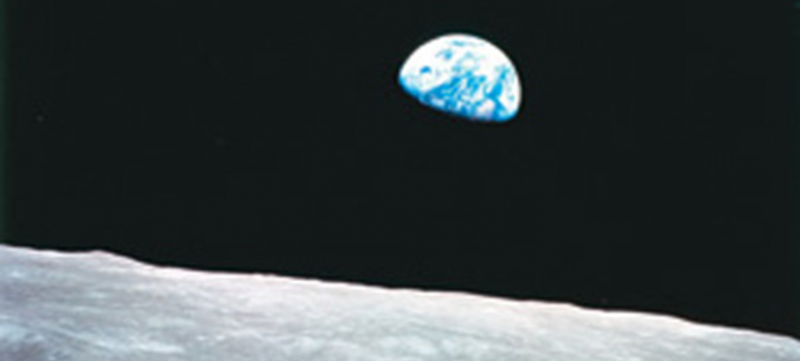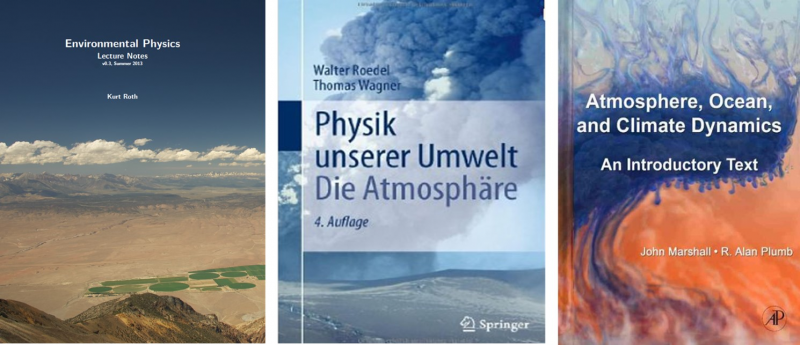
Environmental Physics ...
Environmental Physics
Lecturer: Frank
Link to LSF
164 participants
Welcome to Envrionmental Physics. We start on Tuesday 26. April at 14:15 HS2 at INF 308. The lecture will cover aspects of the earth climate energy balance with a core on geophysical fluid dynamics. The understanding of fluids guide us to the global circulation of the atmosphere and ocean, flow near the boundary and through the hydrosphere. We will even look at the non-Newtonian flow of ice. We introduce isotope methods to study the balance and flow of water, carbon, and energy in the climate system, and we will briefly explore how a numerical model of the climate system can be build and how (un)predictable complex systems behave. Hopefully we have time to explore further subjects such as gas exchange between ocean and atmosphere, climate sensitivity, and past climate change. Overall the lecture is an introduction to the physics of the earth surface environmental system, which builds on many aspects of previous physics lectures. It is entirely in English as a master lecture.
The lecture is accompanied by 10 exercises and a final exam. We expect you to work in teams of 3 and we sincerely hope you take the tutorials as an important moment to exchange with the expert tutors and to discuss about the physics and its relevance with your fellows (across semesters). The tutors are assigned to subjects not to groups, which means you have the unique chance to get to know more or less everyone (postdocs, senior scientists, doctoral fellows). We provide solution sheets to each exercise and we count on you to participate and interact actively. A detailed plan will follow soon.
The videos of my colleagues André Butz and Werner Aeschbach will be available through Moodle, as well as a great (but extensive) script by Kurt Roth. There are great books as well to dig in deeper or to review.
Finally a note: If you are only in the 2. Physics Bachelor Semester you should take this course next winter or even summer. I consider it too early to plunge into Environmental Physics instead of focussing on the core body of the classical physics. There is no time to rush as the lecture is held every semester.
Material
- MKEP4_SS22_01_Introduction_moodle.pdf
- MKEP4_SS22_02_Spaceship_Earth_Radiative_Balance_corrected.pdf
- MKEP4_SS22_03_Air_and_Water_Properties_final.pdf
- MKEP4_SS22_04_Transport_Diffusion_Advection.pdf
- MKEP4_SS22_09_Vorticity_final.pdf
- MKEP4_SS22_10_Potential_Vorticity_Turbulence.pdf
- MKEP4_SS22_12_Turbulence_Autocorrelation.pdf
- MKEP4_SS22_13_Boundary_layer.pdf
- MKEP4_SS22_14_Ocean_Circulation.pdf
- MKEP4_SS22_15_Global_Ocean_and_Atmospheric_Circulation.pdf
- MKEP4_SS22_17_Hydrology_and_cryosphere.pdf
- MKEP4_ScriptV0_lectures1_4.pdf
- MKEP4planning_preliminary.pdf
- MKEP4_SS22_05_Fluid_Mechanics_corr.pdf
- MKEP4_SS22_16_Atmospheric_Circulation_and_Hydrology_cor.pdf
- MKEP4_SS22_06_GFD_corr.pdf
- MKEP4_SS22_19_Isotopes_final.pdf
- MKEP4_SS22_11_Turbulence_Reynolds_Decomposition_corr.pdf
- MKEP4_SS22_22_Box_Model_corr.pdf
- MKEP4_SS22_20_Isotopes_applications.pdf
Exercise sheets
- 1
- 2
- 3
- 4
- 5
- 6
- 7
- 8
- 9
- 10
- 11
Practice groups
- Group 1 (G. Balschbach)
20 participants
INF 229; SR108/110, Mon 9:15 - 10:45 - Group 2 (G. Balschbach)
23 participants
INF 227; SR 2.403, Mon 14:15 - 15:45 - Group 3 (G. Balschbach)
23 participants
INF 229; SR108/110, Tue 9:15 - 10:45 - Group 4 (G. Balschbach)
23 participants
INF 227; SR 3.402, Mon 9:15 - 10:45 - Group 5 (G. Balschbach)
20 participants
INF 227; SR 3.404, Mon 14:15 - 15:45 - Group 6 (G. Balschbach)
23 participants
INF 227; SR 2.402, Tue 9:15 - 10:45 - Group 7 (G. Balschbach)
15 participants
INF 227; SR 1.403, Mon 16:15 - 17:45 - Group 8 (G. Balschbach)
17 participants
INF 227; SR 1.404, Mon 16:15 - 17:45

- Introduction (Earth Radiative Balance, Fluid Advection and Diffusion)
- Geophysical Fluid Dynamics (NSE, Vorticity, Turbulence, Potential Vorticity)
- Boundary layer and large scale motion (Law of the wall, Prandtl's hypothesis, Geostrophy, Sverdrup Balance)
- Isotopes and Applications (Fractionation, Global Meteoric Water Line, Radiocarbon, Keeling assumption)
- Models and Complexity (From simple box-models to complexity, Logistic map and Bifurcation)
- Climate Sensitivity and Past Climate
